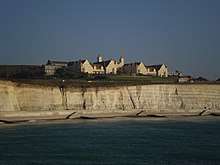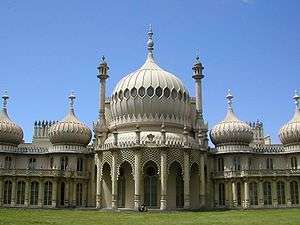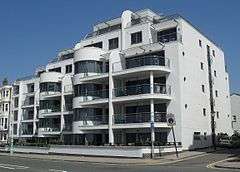Roedean School
 | |
| Motto |
Honneur aulx dignes ("Honour the worthy") |
|---|---|
| Established | 1885 |
| Type | Independent day and boarding school |
| Religion | Church of England |
| Headmaster | Oliver Blond |
| President of Trustees | Lady Patten of Barnes |
| Location |
Roedean Way Brighton East Sussex BN2 5RQ England 50°48′43″N 0°05′06″W / 50.812°N 0.085°WCoordinates: 50°48′43″N 0°05′06″W / 50.812°N 0.085°W |
| Local authority | Brighton and Hove |
| DfE URN | 114616 Tables |
| Students | 600 |
| Gender | Female |
| Ages | 11–18 |
| Houses | 6 |
| Colours |
Blue and White |
| Former pupils | Old Roedeanians |
| Website | www.roedean.co.uk |
Roedean School is an independent day and boarding school founded in 1885 in Roedean Village on the outskirts of Brighton, East Sussex, England, and governed by Royal Charter. It is for girls aged 11 to 18. The campus is situated near the Sussex Downs, on a cliff overlooking Brighton Marina and the English Channel.
The school incorporates dance studios, music classrooms, a 320-seat theatre, a heated indoor swimming pool, a golf course, a private tunnel to the beach, a farm and a chapel, as well as a range of workshops, studios, laboratories and sports pitches.
Roedean School is a member of the Girls' Schools Association and the Headmasters' and Headmistresses' Conference (HMC). The Good Schools Guide stated that the "School has a healthy spirit and much to offer."[1] The Independent Schools Inspectorate rated Roedean as Excellent in all areas (highest category) in its most recent inspection (March 2016).[2]
History
The school was founded in 1885 as Wimbledon House by three sisters: Penelope, Millicent, and Dorothy Lawrence. Their brother was the lawyer Sir Paul Lawrence of Wimbledon, who helped them considerably. Their Lawrence great aunts had been noted school teachers earlier in the century, mainly in Liverpool. Roedean was founded to prepare girls for entrance to the newly opened women's colleges at Cambridge University, Girton (now co-ed) and Newnham Colleges.[3] In 1898, the school moved to its present site, occupying new buildings designed by the architect Sir John Simpson. A sister school, also called Roedean School and co-founded by the youngest Lawrence sister, Theresa, in 1903, is located in Johannesburg, South Africa.
The school motto, Honneur aulx dignes, is in Norman French, and means "Honour the worthy". When pronounced, it sounds like "Honour Roedean".[4]
During the Second World War, the students and staff were temporarily evacuated to Keswick, in the north of England. The school buildings in Brighton, Sussex were used by the Admiralty.[5][6] They adapted it for use by Navy cadets attending the Mining and Torpedo School (known as HMS Vernon). Roedean is one the few girls' schools in the country to have an Old Boys' Association.[7]
The artist Percy Shakespeare was killed by a German bomb while serving at Roedean.[8]
Absorption of St Mary's Hall
Inspired by his friend William Carus-Wilson, who founded Cowan Bridge School, Reverend Henry Venn Elliott proposed to found a similar school for the county. St Mary's Hall was opened in 1836 and was the second-oldest girls' school in the United Kingdom before it was closed in 2009.[9] At that time, its junior section became Roedean's junior school while many senior girls transferred to Roedean. The junior school was closed in 2011 as the school administration decided to focus on secondary and sixth form education.[10][11]
Location
Roedean School is set in 118 acres (48 ha) of grounds off Roedean Way, at the top of a cliff on the Sussex Downs overlooking the sea, approximately in line with Brighton Marina.
Houses
The school community is divided into houses.
The Lawrence and Tanner House (with Senior and Junior wings) system, introduced in 2005, was reversed starting in 2010. A numbered house system was reintroduced. Roedean school has the longest corridor in England.
Year 7 to Year 11 students are spread out amongst House 1, 2, 3, 4. These are named after the house numbers 1–4 of Lewes Crescent, where the School was located prior to moving in 1898 to this campus built for it.
Sixth form (Years 12–13) are admitted to Keswick House, which is detached from the main school building.
In the 1960s, the houses were: Junior House; House Number 1; House Number 2; House Number 3; House Number 4; and a Sanatorium. In 1966 part of the Sanatorium was made into rooms for VIth form girls, two VI form girls from every numbered house. The School retains a sanatorium wing (now known as a health centre) to this day.
Admission procedures
Roedean is a selective school, and entry to the school is based upon various examinations, interviews and reports from the girls' previous schools. Entry at 11+ and 13+ is through the Common Entrance Examination or the Schools own entrance exams Applicants of 11+ and 13+ who are unable to take the Common Entrance Examination, those wishing to enter at 12+ and overseas applicants may sit the Roedean entrance examination.[12]
Notable Alumni
Past pupils are known as Old Roedeanians and include:
Arts
- Vera Stanley Alder, painter
- Enid Marx, designer
- Beatrix Ong MBE, fashion accessories designer
- Phyllis Pearsall MBE, artist, writer and publisher
- Zina Saro-Wiwa, video artist and filmmaker
Healthcare and Education
- Dame Cicely Saunders, nurse, social worker, physician and writer
- Olive Willis, founder of Downe House School
Journalism and Literature
- Alison Adburgham, fashion editor of The Guardian, author and social historian
- Jani Allan, journalist, broadcaster
- Tessa Dahl, novelist and daughter of Roald Dahl
- Adèle Geras, writer
- Zerbanoo Gifford, writer and human rights campaigner
- Naseem Khan (activist), journalist and activist
- Noo Saro-Wiwa, author
- Nancy Spain, journalist, author and broadcaster
- Katharine Whitehorn, journalist, writer, and columnist
Members of the Nobility
Military and Sport
- Barbara Calder (1924-2018), yachtswoman[16]
- Elizabeth Devereux-Rochester, member of SOE F Section
- Tanya Streeter[17], world champion freediver
- Philippa Tattersall[17], soldier and first female to complete the All Arms Commando Course
Politics and Activism
- Ursula Graham Bower, anthropologist and guerrilla fighter in Burma during World War II
- Jill Braithwaite, Lady Braithwaite, anthropologist, diplomat and social reformer
- Anna Campbell, activist
- Lynda Chalker, Baroness Chalker, politician
- Dame Margaret Cole, politician and writer
- Birgit Cunningham, campaigner[18]
Theatre, Television, and Film
- Jill Balcon, actress
- Hermione Cockburn, broadcaster
- Noel Dyson, actress
- Lucy Griffiths, actress
- Rebecca Hall, actress
- Jessica Hester Hsuan, actress
- Verity Lambert OBE, television producer
- Sarah Miles, actress
- Rhona Mitra, actress, model and singer-songwriter
- Honeysuckle Weeks, actress
- Perdita Weeks, actress
Roedeanians in fiction
- Sophie (bohemian and perpetually dissatisfied single mother in David Kane's film This Year's Love, 1993)
- Chummy Browne (Camilla Fortescue-Cholmondeley-Browne) in Call the Midwife
- Lady Penelope Creighton-Ward (heroine in the marionette series Thunderbirds)
- Dawn Drummond-Clayton (Tarzan's great-granddaughter in the Bunduki series)
- Emily James (Head of PR, Hotel Babylon)
- Scarlett Papava (a character in the James Bond novel Devil May Care)
- Lucy Saxon, a character in the science fiction series Doctor Who. Both Emily James and Lucy Saxon are portrayed by Alexandra Moen.
- Monica Simmons and her five sisters in Pigs Have Wings and Galahad at Blandings
- Cecilia Tallis in the novel Atonement
- Lady Mary Wimsey in Dorothy L. Sayers' Lord Peter Wimsey novels
- Evelyn Caldessa in Mike Carey's Felix Castor novels
- Phyllida Erskine-Brown (née Trant) in the Rumpole of the Bailey series
- Lady Constance in the Blandings series
- Saffron Courtney (daughter of Leon Courtney) in Wilbur Smith's novel "War Cry" attends Roedean in South Africa and England
- Emma Holmes in Elly Griffiths’ Magic Men mystery novels
References
- ↑ "Archived copy". Archived from the original on 22 April 2009. Retrieved 13 October 2008.
- ↑ "ISI Inspection 2016". roedean.co.uk. Retrieved 1 July 2016.
- ↑ History of Roedean Archived 3 September 2014 at the Wayback Machine.
- ↑ Parent, independent school (29 August 2013). "Do you know what your school motto means? | independent school Parent". independent school Parent. Retrieved 15 November 2016.
- ↑ "WW2 – The Second World War: Keswick Hotel during the Second World War".
- ↑ "obituary:Lieutenant Claude Holloway". The Daily Telegraph. 16 May 2012. Retrieved 16 May 2012.
- ↑ Roedean Old Boys' Association Archived 13 August 2012 at the Wayback Machine.
- ↑ "Percy Shakespeare Collection". Dudley Metropolitan Borough Council. Archived from the original on 19 September 2012. Retrieved 3 November 2012.
- ↑ "St Mary's Hall Association". 125 years of Roedean. 12 December 2009. Archived from the original on 12 December 2009. Retrieved 28 March 2018.
- ↑ Junior School Archived 19 August 2012 at the Wayback Machine.
- ↑ "Roedean Junior School". roedean.co.uk. 2 June 2012. Archived from the original on 2 January 2012. Retrieved 28 March 2018.
- ↑ "Year 7 and 9 | Roedean School". www.roedean.co.uk. Retrieved 1 July 2016.
- ↑ "The Peerage: Lady Davina Claire Theresa Boyle". thepeerage.com. Retrieved 29 August 2018.
- ↑ "The Peerage: Lady Emma Caroline de Vere Beauclerk". thepeerage.com. Retrieved 29 August 2018.
- ↑ "The Peerage: Lady Cara Mary Cecilia Boyle Beauclerk". thepeerage.com. Retrieved 29 August 2018.
- ↑ "Obituary: Barbara Calder, pioneering yachtswoman". scotsman.com. Retrieved 10 April 2018.
- 1 2 Milner, Catherine; de Burton, Simon (30 June 2002). "Daisy pulls it off – with a spanner". The Daily Telegraph.
- ↑ Beth Hale, 'The Roedean Girl Who Lost Her Way on Sunset Strip', in Daily Mail (London) dated 24 January 2011
External links
| Wikimedia Commons has media related to Roedean School. |
- Official website
- St Mary's Hall Association Website
- Profile on the ISC website
- ISI Inspection Reports

.jpg)
.jpg)
